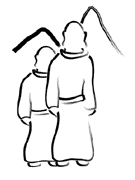On The Way: The Daily Zen Journal
Song of Realizing the Way
Yung-chia (d. 713)
Haven’t you met someone seasoned in the Way of Ease, a person with nothing to do and nothing to master, who neither rejects thought nor seeks truth?
The real nature of ignorance is buddha-nature itself. The empty, illusory body is the very body of the Dharma. When the Dharma-body is realized, there’s nothing at all. The original nature of all things is innately Buddha.
Elements of the self come and go like clouds, without purpose. Greed, hate, and delusion appear and disappear like ocean foam.
When you reach the heart of reality, you find neither self nor other, and even the worst kind of karma dissolves at once. The instant you awaken to the Ch’an of the Tathagata, all practices and means of liberation are perfected at  once.
once.
In life’s dream, passing from heaven to hell, each realm seems real. But with awakening, the whole cosmos is completely empty.
Dust builds up on a mind-mirror not cleaned. With one decisive stroke now, lay the glass bare! Who is it that has no thought? Who is it that’s unborn? It’s as if really not born, yet not unborn either.
Going straight to the root is the hallmark of the Buddha; picking up leaves and collecting branches is no use at all. Most people don’t know the pearl that answers all wishes, the great pearl found in the treasurehouse of the Tathagata.
Don’t seek the true and don’t reject the false; realize the emptiness and formlessness of both. The mind-mirror shines brilliantly, without obstruction, its light reaching worlds as countless as sands of the Ganges.
I reveal the bliss-bestowing pearl to you now, and all who take this to heart will come to accord: When you see clearly, there’s nothing at all; there are no people, there are no Buddhas.
The myriad worlds are like so much foam on the sea, old worthies and great sages merely flashes of lightning.
Yung-chia (d. 713)
Excerpted from The Roaring Stream; A New Zen Reader edited by Nelson Foster and Jack Shoemaker




“Yung-chia Hsuan-chueh is known in the annals of Ch’an as the Master Who Spent One Night with the Ancestor. The Ancestor in question is Hui-neng. The famous Song of Realizing the Way alludes to this legendary meeting of minds.
Though the author of the poem refers to himself as a mountain monk and sings the praises of hermit life, the Yung-chia of record was hardly a reclusive or obscure figure. He attracted enough notice during his lifetime to draw numerous disciples, and after his death, the imperial court honored him with the title Master of Formlessness.
Along with traces of Taoism, the Song of Realizing the Way contains numerous references to the teachings, metaphors, and mythology of Indian Buddhism. All the same, it is unmistakably a Ch’an poem, laying out many of the school’s central themes, including the futility of conceptual study as a means to true understanding, the necessity of realization, its suddenness and availability to all, and the nature and importance of emptiness and not-knowing.”
taken from The Roaring Stream; A New Zen Reader edited by Nelson Foster and Jack Shoemaker
The journal excerpt is from the longer original poem to convey the flavor and depth of the writing. Through writing such as this we come to love the way of the sages. Through our pure intent and commitment we follow the way of the sages.
With gratitude,
Elana, Scribe for Daily Zen